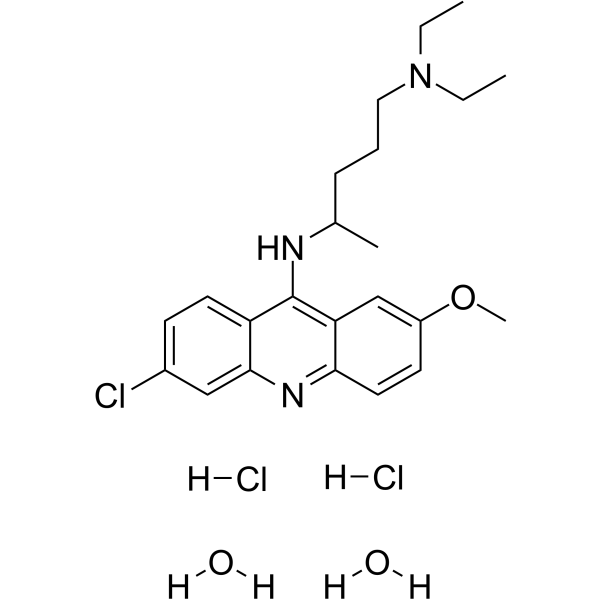上海金畔生物科技有限公司为生命科学和医药研发人员提供生物活性分子抑制剂、激动剂、特异性抑制剂、化合物库、重组蛋白,专注于信号通路和疾病研究领域。
Quinacrine hydrochloride hydrate (Synonyms: Mepacrine hydrochloride hydrate; SN-390 hydrochloride hydrate)
Quinacrine hydrochloride hydrate (Mepacrine hydrochloride hydrate) 是一种抗疟剂 (antimalarial),在体内外均具有抗肿瘤作用。Quinacrine hydrochloride hydrate 抑制 NF-κB 并激活 p53 信号转导,诱导肿瘤细胞发生凋亡 (apoptosis)。
Quinacrine hydrochloride hydrate Chemical Structure
CAS No. : 6151-30-0
| 规格 |
|
是否有货 |
|
| 100 mg |
|
询价 |
|
| 250 mg |
|
询价 |
|
| 500 mg |
|
询价 |
|
* Please select Quantity before adding items.
Quinacrine hydrochloride hydrate 的其他形式现货产品:
Quinacrine dihydrochloride l-Atabrine dihydrochloride d-Atabrine dihydrochloride
| 生物活性 |
Quinacrine hydrochloride hydrate (Mepacrine hydrochloride hydrate) is an antimalarial agent, which possess anticancer effect both in vitro and vivo. Quinacrine hydrochloride hydrate suppresses NF-κB and activates p53 signaling, which results in the induction of the apoptosis[1].
|
体外研究
(In Vitro) |
Quinacrine (5-20 μM; 24 hours) inhibits the growth of SGC-7901 cells[1].
Quinacrine (7.5 and 15 μM; 24 hours) induces apoptosis in SGC-7901 cells, which is associated with mitochondria-dependent signal pathway and involves p53 upregulation and caspase-3 activation pathway[1].
Quinacrine (15 μM; 24 hours) treatment significantly increased the levels of proapoptotic proteins, including cytochrome c, Bax, and p53, and decreased the levels of antiapoptotic protein Bcl-2, thus shifting the ratio of Bax/Bcl-2 in favor of apoptosis [1].
Shanghai Jinpan Biotech Co Ltd has not independently confirmed the accuracy of these methods. They are for reference only.
Cell Viability Assay[1]
| Cell Line: |
SGC-7901 cells |
| Concentration: |
0, 5, 10, 15, and 20 μM |
| Incubation Time: |
24 hours |
| Result: |
Cell viability was inhibited in a dose-dependent manner, and the mean IC50 value is 16.18 μM. |
Apoptosis Analysis[1]
| Cell Line: |
SGC-7901 cells |
| Concentration: |
7.5 and 15 μM |
| Incubation Time: |
24 hours |
| Result: |
The percentage of apoptotic cells, including the early phase and late phase apoptosis, increased to 26.30%, compared with control group of 3.37%. |
Western Blot Analysis[1]
| Cell Line: |
SGC-7901 cells |
| Concentration: |
15 μM |
| Incubation Time: |
24 hours |
| Result: |
The relative quantity of cytochrome c protein was upregulated, increased from 0.10 to 0.24.
The relative quantity of p53 protein was dramatically increased, from 0.06 to 0.19.
The Bax/Bcl-2 ratio was dramatically elevated from 1.21 to 2.59. |
|
体内研究
(In Vivo) |
Quinacrine (100 mg/kg three times per week for two consecutive weeks) significantly suppresses circulating blast cells at days 30/31 and increases the median survival time (MST). Quinacrine does not decrease the body weight of treated animals at the tested dose[2].
Shanghai Jinpan Biotech Co Ltd has not independently confirmed the accuracy of these methods. They are for reference only.
| Animal Model: |
Female SCID mice with acute myeloid leukemia (AML)-PS model[2] |
| Dosage: |
100 mg/kg |
| Administration: |
Administered by oral gavage (po); three times a week for two consecutive weeks |
| Result: |
In the first AML mouse in vivo study, evaluation of circulating leukemic cells detected in blood samples (in percent of white blood cells (WBC)) at day 30/31 showed 72% human tumor cells in the control mice, whereas in mice treated with Quinacrine, this was only 2.2%.
The MST of control mice was 34 days whereas it was 46 days in Quinacrine-treated mice. |
|
| Clinical Trial |
|
| 分子量 |
|
| Formula |
|
| CAS 号 |
|
| 中文名称 |
|
| 运输条件 |
Room temperature in continental US; may vary elsewhere.
|
| 储存方式 |
Please store the product under the recommended conditions in the Certificate of Analysis.
|
| 参考文献 |
-
[1]. Xiaoyang Wu, et al. Quinacrine Inhibits Cell Growth and Induces Apoptosis in Human Gastric Cancer Cell Line SGC-7901. Curr Ther Res Clin Exp. 2012 Feb;73(1-2):52-64.
[2]. Anna Eriksson, et al. Towards repositioning of quinacrine for treatment of acute myeloid leukemia – Promising synergies and in vivo effects. Leuk Res. 2017 Dec;63:41-46.
|
所有产品仅用作科学研究或药证申报,我们不为任何个人用途提供产品和服务

